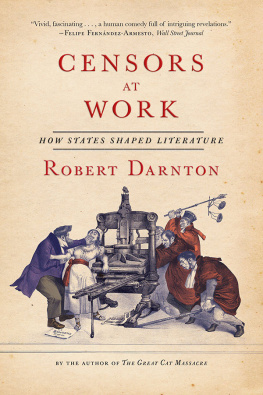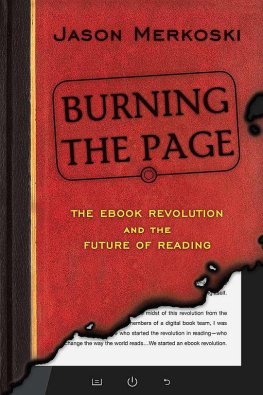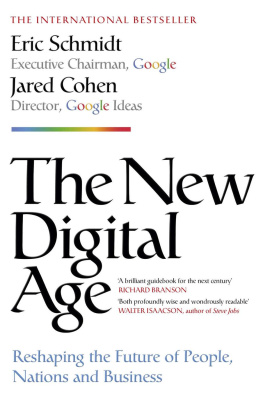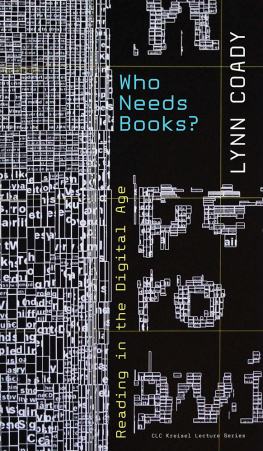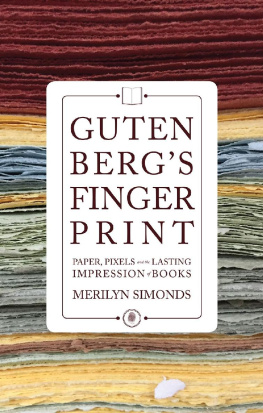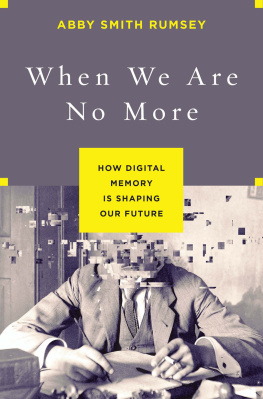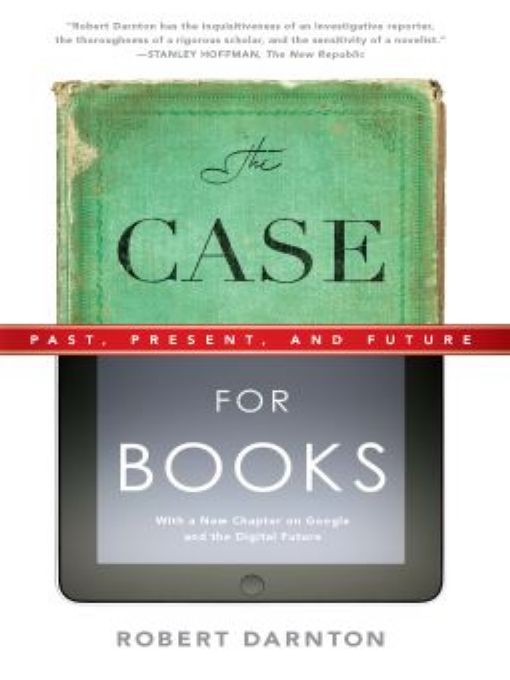Table of Contents
Praise for Robert Darnton and The Case for Books
Robert Darntons essays collected in The Case for Books should be read not only by those concerned at the technological threat to the printed page but by all the younger digital natives who know text primarily as a verb. Thus does H. J. Jackson begin her review of a nuanced and subtle collection which, while addressing anxieties about the present and future of Google, is less alarmist than others of the older generation have been.
Times Literary Supplement
[A] fascinating history of our literary past and a penetrating look at the disruptive forces shaping the future of publishing. Almost no topic is untouched, from the role of libraries to metadata, the print traditions of Europe, piracy old and new, Darntons own forays into digital initiatives, and the efficacyeven the beautyof our changing literary landscape over centuries of development... the book offers a deep dive into the evolution of the written and published word.
Publishers Weekly
Historian and library director Darnton has written expansively and lucidly on the history of books and libraries. This collection of his influential essays from the past decade neatly encapsulates one significant part of his immense legacy and contribution to intellectual history.... Every one of Darntons essays reflects both his erudition and his good humor.
Booklist
Neither jeremiad nor rant, this eloquent gem by the worlds premier historian of the book is an exploration of how print can flourish in the digital world. Robert Darnton, director of the Harvard University Library and founder of the Gutenberg-e online book program, explains how books are parts of circuits of information and that historians can show that books do not merely recount history; they make it. Rather than deploring the (exaggerated) demise of the book, we need to understand how all of us in the world of communication, from the librarians, publishers, computer engineers, and webmasters to readers, can make it together through the thickets of the information landscape.
Editors Choice, Chicago Tribune
Darnton knows this territory as well as anyone and views the subject from a unique perspective... The stimulating and thought-provoking essays in The Case for Books: Past, Present, and Future provide us with an excellent overview of where we have been and where we are likely to be headed... Darntons thoughtful and incisive essays on this important topic should be of interest to a wide range of book lovers.
BookPage
In this collection of well-informed essays, Robert Darnton, historian and director of the Harvard University Library, offers a decidedly open-minded perspective on some of the technological changes affecting the world of books and leads an insightful and learned discussion of topics that will appeal to more traditional bibliophiles.
Shelf Awareness
Darntons book ticks all the boxes. It looks nice. It smells nice. Its content is intelligent and forms a valuable primer to an increasingly important debate.
The Scotsman
[Darnton has] applied a masterly eye for detail, condensing a history of books into enlightening insights about where we may find the bookin its many formsin the future.
Star Tribune
ALSO BY ROBERT DARNTON
The Devil in the Holy Water, or the Art of Slander in
France from Louis XIV to Napoleon
George Washingtons False Teeth:
An Unconventional Guide to the Eighteenth Century
J.-P. Brissot, His Career and Correspondence, 17791787
Poesie und Polizei. ffentliche Meinung und
Kommunikationsnetzwerke im Paris des 18. Jahrhunderts
The Forbidden Best-Sellers of Prerevolutionary France
The Corpus of Clandestine Literature in France, 17691789
Berlin Journal, 19891990
Gens de lettres, gens du livre
Edition et sdition. Lunivers de la littrature
clandestine au XVIIIe sicle
The Kiss of Lamourette: Reflections in Cultural History
The Great Cat Massacre and
Other Episodes in French Cultural History
The Literary Underground of the Old Regime
The Business of Enlightenment:
A Publishing History of the Encyclopdie
Mesmerism and the End of the Enlightenment in France
Le Rayonnement dune maison ddition dans lEurope
des Lumires: la Socit typographique
de Neuchtel 17691789 (co-editor)
Dmocratie (co-editor)
Revolution in Print: The Press in France 17751800 (co-editor)

INTRODUCTION
This is a book about books, an unashamed apology for the printed word, past, present, and future. It is also an argument about the place of books in the digital environment that has now become a fundamental fact of life for millions of human beings. Far from deploring electronic modes of communication, I want to explore the possibilities of aligning them with the power that Johannes Gutenberg unleashed more than five centuries ago. What common ground exists between old books and e-books? What mutual advantages link libraries with the Internet? Those questions may sound empty in the abstract, but they take concrete form in decisions made every day by players in the communication industrywebmasters, computer engineers, financiers, lawyers, publishers, librarians, and a great many ordinary readers.
Having played a bit part myself, I offer this collection of essays for whatever help it may provide to anyone attempting to find a way through the information landscape. My own way led through a great deal of unfamiliar territory. After a brief career as a reporter, mainly covering crime for the Newark Star Ledger and the New York Times, I became a college professor and spent most of my time in the eighteenth century, studying a subject that came to be known as the history of books. Research on publishing in the age of Enlightenment led to an opportunity to observe publishers at work in the modern world, when I spent four years on the editorial board of the Princeton University Press and then fifteen years as a trustee of the Oxford University Press (USA). The OUPs headquarters on Madison Avenue provided a view of the trade as well as the academic side of publishing. A summer as a scholar in residence at the CBS network opened up another view from a corporate office high up on Sixth Avenue. Election to the board of trustees of the New York Public Library brought me back to the heart of book country at Fifth Avenue and Forty-second Street. By then I was publishing trade books at W. W. Norton a block away and articles with the New York Review of Books across town at Broadway and Fifty-seventh Street. I could not have followed a more revealing itinerary through the contemporary world of books, had I planned it in advance. But it all happened by improvisation and good luck, as occasions arose.
Along the way, I helped launch two publishing ventures of my own design: the Electronic Enlightenment, a digital database formed from the correspondence of Voltaire, Rousseau, Franklin, and Jefferson (it is now being sold by the Voltaire Foundation of Oxford as a subscription package whose contents differ somewhat from what I had originally envisioned), and Gutenberg-e, a series of electronic monographs produced from prize-winning dissertations in history (they, too, were sold as subscriptions by the publisher, the Columbia University Press). The Andrew W. Mellon Foundation financed both projects and helped me learn something about the importance of business plans and the possibility of promoting the public good from initiatives in the private sector.


